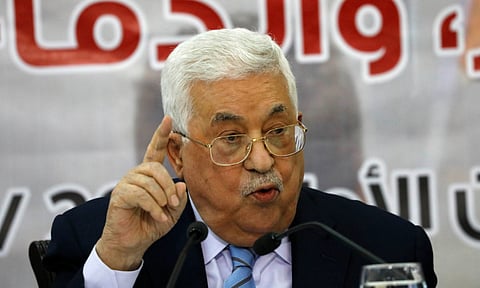Unravelling of the Palestinian national movement
The deepening Fatah-Hamas rift and US-Israel moves have left people to face the vicious occupation on their own

It was not the first time that the Palestine Central Council (PCC) had adopted decisions and made recommendations to end commitments by the Palestine Liberation Organisation (PLO) and the Palestinian National Authority (PNA) towards Israel under the Oslo Accords. In fact there was a sense of deja vu this week when the PCC met in an ordinary session chaired by Palestinian President Mahmoud Abbas. Similar decisions were adopted earlier this year and Abbas had vowed, on more than one occasion, to carry them out. But he didn’t. There are no guarantees that this time it would be different.
One thing the PCC, the second highest Palestinian body after the Palestine National Council (PNC) which is the PLO’s parliament in exile, did not do is to dissolve the Palestine Legislative Council (PLC), which has been dominated by Hamas since 2006.
No one is sure that the PCC has the legal right to do so. Fatah, the largest faction in the PLO, had called on the PCC, through its Revolutionary Council, to dissolve the PLC and hold new presidential and legislative elections. The terms of the president and the PLC had expired by the end of 2010.
Abbas was furious that the PCC’s meetings in Ramallah this week were boycotted by major Palestinian factions such as the Democratic Front for the Liberation of Palestine (DFLP) and the Popular Front for the Liberation of Palestine (PFLP). Hamas and Islamic Jihad are not members of the PLO. He described the boycott as shameful, but the two key Fatah partners responded by decrying the stalling and procrastination in implementing previous resolutions and the current state of unilateral decision making within the PLO’s body.
Occupying power
The PCC’s final communique this week, which was carried out by Palestinian News Agency (WAFA) stated the following: “In view of Israel’s continued denial of the signed agreements, the PCC, in confirmation of its previous decision and considering that the transitional phase no longer exists, decides to end the commitments of the PLO and the Palestinian National Authority towards its agreements with the occupying power, suspend recognition of the State of Israel until its recognition of the State of Palestine on the June 4, 1967 borders with East Jerusalem as its capital, end security coordination in all its forms, and disengage economically from Israel on the grounds that the transitional phase, including the Paris Economic Protocols no longer exist.”
Whether Abbas and the PLO’s Executive Committee will implement these resolutions remains to be seen. Abbas had frequently threatened to end the all-important security coordination with Israel. In fact such coordination was suspended a few months ago, at least on paper, while Israel gave signs that it had never stopped.
So what did Abbas really want? He had hoped that the dissolution of the PLC would take any remaining legitimacy from Hamas, which has been in control of Gaza since 2007. Hamas has been engaged in secret talks with Israel to reach a long-term truce that would end the economic blockade and reinforce its grip on power.
Egyptian efforts to conclude a reconciliation deal between Fatah and Hamas and end more than a decade of widening rift had been unsuccessful. Abbas fears that the US, Israel and other parties are moving to cement a de facto separation between the West Bank and Gaza Strip.
But the Palestinian Basic Law is clear that the PLC cannot be dissolved under any circumstances and that only when newly elected candidates are sworn in that the old council ceases to exist. This means that in case of Abbas’ death or inability to govern due to ill health, speaker of the PLC, currently a Hamas member, will act as interim president.
Failing to unite
Legal and political wrangles have done little to end the rift, hold fresh presidential and legislative elections or respond to a series of US and Israeli moves that have undermined Oslo and other agreements. Abbas has resisted pressure to resume contacts with Israel and the US, but he has failed to unite the domestic front or reform the PLO. To say that the Palestinians are going through their worst days ever in the past 25 years is a gross understatement.
The latest PCC meeting has deepened the Fatah-Hamas rift but it also underlined the estrangement of Fatah’s closest partners, DFLP and PFLP. Added to this is the effect of US and Israeli financial penalties against the PNA which have put additional burdens on Palestinians, especially in the West Bank.
If as Abbas says the US is about to pass the second Balfour Declaration through the so-called ultimate deal aimed at liquidating the Palestinian Question, then inter-Palestinian unity is the one thing that can stand in its way.
Unfortunately, Abbas has neither been able to secure that unity nor has he been forthcoming in carrying out his threats against Israel. Even Fatah itself is now suffering from divisions and internal rancour. The bitter fact is that the Palestinian national movement is unravelling, leaving the Palestinian people on their own in the face of vicious occupation.
Osama Al Sharif is a journalist and political commentator based in Amman.
Sign up for the Daily Briefing
Get the latest news and updates straight to your inbox



